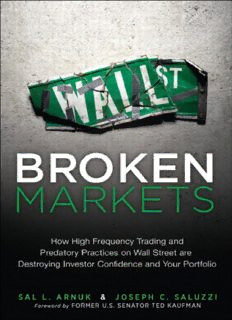
Broken Markets: How High Frequency Trading and Predatory Practices on Wall Street are Destroying Investor Confidence and Your Portfolio PDF
Preview Broken Markets: How High Frequency Trading and Predatory Practices on Wall Street are Destroying Investor Confidence and Your Portfolio
Broken Markets How High Frequency Trading and Predatory Practices on Wall Street Are Destroying Investor Confidence and Your Portfolio Sal Arnuk Joseph Saluzzi Vice President, Publisher: Tim Moore Associate Publisher and Director of Marketing: Amy Neidlinger Executive Editor: Jim Boyd Operations Specialist: Jodi Kemper Assistant Marketing Manager: Megan Graue Cover Designer: Chuti Prasertsith Managing Editor: Kristy Hart Project Editor: Jovana San Nicolas-Shirley Copy Editor: Apostrophe Editing Services Proofreader: Gill Editorial Services Indexer: Lisa Stumpf Senior Compositor: Gloria Schurick Manufacturing Buyer: Dan Uhrig © 2012 by Sal Arnuk and Joseph Saluzzi Publishing as FT Press Upper Saddle River, New Jersey 07458 This book is sold with the understanding that neither the authors nor the publisher is engaged in rendering legal, accounting, or other professional services or advice by publishing this book. Each individual situation is unique. Thus, if legal or financial advice or other expert assistance is required in a specific situation, the services of a competent professional should be sought to ensure that the situation has been evaluated carefully and appropriately. The authors and the publisher disclaim any liability, loss, or risk resulting directly or indirectly, from the use or application of any of the contents of this book. FT Press offers excellent discounts on this book when ordered in quantity for bulk purchases or special sales. For more information, please contact U.S. Corporate and Government Sales, 1-800-382-3419, [email protected]. For sales outside the U.S., please contact International Sales at [email protected]. Company and product names mentioned herein are the trademarks or registered trademarks of their respective owners. All rights reserved. No part of this book may be reproduced, in any form or by any means, without permission in writing from the publisher. Printed in the United States of America First Printing May 2012 ISBN-10: 0-13-287524-1 ISBN-13: 978-0-13-287524-0 Pearson Education LTD. Pearson Education Australia PTY, Limited. Pearson Education Singapore, Pte. Ltd. Pearson Education Asia, Ltd. Pearson Education Canada, Ltd. Pearson Educatión de Mexico, S.A. de C.V. Pearson Education—Japan Pearson Education Malaysia, Pte. Ltd. The Library of Congress cataloging-in-publication data is on file. We dedicate this book to the executives at the major U.S. stock exchanges, to high frequency trading firms, to lobbyists, and to numerous other conflicted parties in Washington, D.C., and Wall Street. Without your actions, we would never have become outraged enough to write this book. Contents Foreword by Former U.S. Senator Ted Kaufman Introduction Chapter 1 Broken Markets Why Has Our Stock Market Structure Changed So Drastically? When Did HFT Start? How Did HFT Become So Big? Why Have We Allowed This to Happen? Will There Be Another Market Crash? Where’s the SEC in All This? Endnotes Chapter 2 The Curtain Pulled Back on High Frequency Trading What Is High Frequency Trading, and Who Is Doing It? Market Making Rebate Arbitrage Statistical Arbitrage Market Structure and Latency Arbitrage Momentum Ignition How the World Began to Learn About HFT The SEC’s Round Table on Equity Market Structure—or Sal Goes to Washington 60 Minutes—or Joe Makes It to Primetime Endnotes Chapter 3 Web of Chaos NYSE and the Regionals NASDAQ SOES Instinet Problems for NYSE and NASDAQ Four For-Profit Exchanges Conflicts of Interest Fragmentation The Tale of the Aggregator Endnotes Chapter 4 Regulatory Purgatory Early 1990s Change in Regulations Late 1990s Regulations—Decimalization, Reg NMS, and Demutualization Early 2000s—Reg NMS Endnotes Chapter 5 Regulatory Hangover The Flash Order Controversy The Concept Release on Market Structure...Interrupted The Band-Aid Fixes Endnotes Chapter 6 The Arms Merchants Colocation Private Data Feeds Rebates for Order Flow (The Maker/Taker Model) Not Your Father’s Stock Exchange Endnotes Chapter 7 It’s the Data, Stupid Information for Sale on Hidden Customer Orders Data Theft on Wall Street The Heat Is On Phantom Indexes Machine-Readable News Who Owns the Data? Endnotes Chapter 8 Heart of Darkness The Birth of Dark Pools Dark Pools Cross Over...to the Dark Side How HFT Internalization in Dark Pools Hurts Investors How Latency Arbitrage in Dark Pools Hurts Investors What Else Is Being Done to Stop Dark Pool Abuse? Endnotes Chapter 9 Dude, Where’s My Order? How Algorithms Work: Making the Sausage How a Smart Order Router (SOR) Works: Regrinding the Sausage Complex by Design: What Would Major Do? Endnotes Chapter 10 The Flash Crash Deregulation Critics This Is the New Marketplace Endnotes Chapter 11 The Aftermath The Joint Committee Weighs In The Abyss of Destruction Endnotes Chapter 12 Killing the Stock Market That Laid the Golden Eggs Reversal of Fortune The Window Is Open! Oops! The Window Is Shut! Winds of Change? A Blueprint for Effective Stock Markets Alternative Views The Case for Higher Cost Markets: The Stock Market Toll Paradox Give Issuers Control over Their Tick Sizes Call for a New Parallel Stock Market Endnotes Chapter 13 Call to Action We Are Not Alone There Is an Alternative Fight for Your Rights Raise Your Voice Repair Our Broken Markets Endnotes Appendix Themis Trading White papers Index
Description: